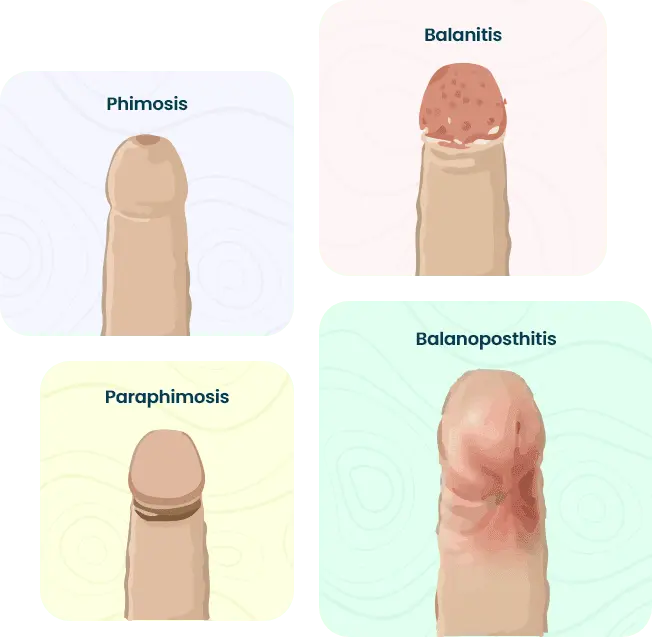Made Stress-Free Reliable Hassle-Free Convenient Pocket friendly
Request a call back
The surgery you need is
just a click away


21K +
Consultations

1180
Surgeries

100+
Partner Hospitals

10000+
Hassle-free Consultation

5000+
Smooth surgeries

500+
Expert Doctors

100+
Trusted hospitals

Affordable Circumcision Surgery in Pune
New studies and cultural shifts have encouraged us to take a deeper look at the practice of circumcision in recent decades. Dedicated to providing hassle-free laser circumcision surgery at the best facilities with individualised care, Aapkacare Health is a patient-centered, technology-driven healthcare service provider. Meet with Aapkacare Health’s skilled surgeons and opt for a highly advanced circumcision surgery at affordable rates.
- 15 Min Procedure
- Free Pick Up & Drop
- No Stitches
- Complete Insurance Support
- Minimal Pain
- Post Surgery Assistance
About Circumcision
Doctors & Hospitals
Why aapkacare
FAQ
What is Circumcision (Sunnath)?
Circumcision is a surgical procedure that involves the removal of the foreskin, which is the fold of skin that covers the head of the penis. It is typically performed on males, and the practice has been carried out for centuries for various cultural, religious, and medical reasons.
It’s important to note that opinions about circumcision vary widely, and deciding to have a circumcision is personal. It should be made after carefully considering all relevant factors, including medical advice, cultural and religious beliefs, and personal preferences

Identify the Signs of Hernia
Inability to pull the foreskin back
The foreskin is trapped behind the glans

Painful and swollen penis
Not being able to clean under the foreskin
Infections of the foreskin
Understand the Benefits of Circumcision
Here are some potential benefits often cited in favour of circumcision:
Hygiene
Circumcision may make it easier to clean the penis, as there is no foreskin to retract and clean underneath. This can reduce the risk of infections and the buildup of smegma, a substance that can accumulate under the foreskin.

Reduced Risk of Urinary Tract Infections (UTIs)
Some studies have suggested that circumcised males may have a lower risk of UTIs, particularly in infancy. However, the overall risk of UTIs in males is relatively low, and the protective effect of circumcision is not considered a compelling reason for the procedure.
Lower Risk of Sexually Transmitted Infections (STIs)
Research has indicated that circumcision may reduce the risk of certain STIs, including HIV, herpes, and HPV, in males. It is important to note that circumcision is not a substitute for safe sexual practices and condom use.
Decreased Risk of Penile Cancer
Circumcision has been associated with a reduced risk of penile cancer. However, penile cancer is rare, and the risk reduction is relatively small. Other factors, such as smoking and HPV infection, play a more significant role in penile cancer risk..

Prevention of Phimosis
Circumcision can prevent or treat phimosis, a condition in which the foreskin becomes too tight to retract over the head of the penis. Phimosis can be painful and may lead to other health issues.
Circumcision Can Treat Several Conditions
Phimosis occurs among uncircumcised males where the foreskin of the penis can be pulled back behind the head of the penis but cannot be forced back into place resulting in a lack of blood supply to the penis.
Paraphimosis is a condition where the foreskin gets stuck behind the head of the penis.Paraphimosis only occurs in children and adults who aren’ t circumcised and result in soreness or pain, swelling and discoloration at the head of the penis.
Glans inflammation or balanitis is pain and inflammation(swelling and irritation) of the glans(head) of the penis that occurs most often among uncircumcised males.
Foreskin inflammation(balanoposthitis) is inflammation of the head of your penis and foreskin.Its causes include poor hygiene, bacterial and fungal infections, allergies, STDs, and STIs.Some of the symptoms include pain, swelling, and discoloration.


- HOW
- WHAT
How should a circumcised penis be taken care of ?
- Keep It Clean
Cleanliness is crucial during the healing process. - Gentle Patting
Gently pat the penis dry with a clean, soft cloth after washing. - Avoid Aggressive Cleaning
Do not try to forcibly retract the remaining foreskin if it hasn't fully separated from the head of the penis. This may lead to unwanted injury. - Apply Ointment
Follow your healthcare provider's instructions regarding ointment use. - Avoid Tight Clothing
Dress your child in loose-fitting clothing to prevent friction and irritation against the healing area. - Change Diapers
If the child is in diapers, change them regularly to keep the area clean and dry - Avoid Bathing in Soapy Water
While the circumcision site is healing, it's advisable to avoid bathing in soapy water, especially in a bathtub. Instead, gentle showers prevent the incision from soaking in potentially irritating substances. - Follow Post-Operative Instructions
If the circumcision was performed on an adult or older child, it's crucial to follow the specific post-operative instructions provided by the healthcare provider
What are some medical issues that may require circumcision?
- Phimosis
Phimosis is when the foreskin is too tight and cannot be retracted over the head of the penis. - Paraphimosis
Paraphimosis occurs when the foreskin is retracted behind the head of the penis and becomes trapped, causing swelling and constriction of blood flow. - Recurrent Balanitis
Balanitis is the inflammation of the glans (head) of the penis, often due to infection or irritation. - Frenulum Breve
Frenulum breve is a condition in which the frenulum (a band of tissue on the underside of the penis) is too short and restricts the movement of the foreskin. - Chronic Urinary Tract Infections (UTIs)
In some cases, individuals who experience chronic UTIs may be advised to undergo circumcision, as it has been suggested that circumcision may reduce the risk of UTIs. - Penile Cancer
While penile cancer is rare, but more common in uncircumcised men - Balanitis Xerotica Obliterans (BXO)
BXO is a condition that causes the foreskin to become thickened and scarred, often leading to phimosis. - Recurrent Foreskin Infections
In some cases, individuals may experience recurrent infections of the foreskin or glans, which do not respond to conservative treatments.

Our Experts Explain
How should a circumcised penis be taken care of ?
Here are some steps to take care of a circumcised penis:
- Keep It Clean
Cleanliness is crucial during the healing process. - Gentle Patting
Gently pat the penis dry with a clean, soft cloth after washing. - Avoid Aggressive Cleaning
Do not try to forcibly retract the remaining foreskin if it hasn’t fully separated from the head of the penis. This may lead to unwanted injury. - Apply Ointment
Follow your healthcare provider’s instructions regarding ointment use. - Avoid Tight Clothing
Dress your child in loose-fitting clothing to prevent friction and irritation against the healing area. - Change Diapers
If the child is in diapers, change them regularly to keep the area clean and dry - Avoid Bathing in Soapy Water
While the circumcision site is healing, it’s advisable to avoid bathing in soapy water, especially in a bathtub. Instead, gentle showers prevent the incision from soaking in potentially irritating substances. - Follow Post-Operative Instructions
If the circumcision was performed on an adult or older child, it’s crucial to follow the specific post-operative instructions provided by the healthcare provider
What are some medical issues that may require circumcision?
Circumcision is not typically considered a routine medical procedure; some specific medical conditions or issues may necessitate circumcision. Some of these medical issues include:
- Phimosis
Phimosis is when the foreskin is too tight and cannot be retracted over the head of the penis. - Paraphimosis
Paraphimosis occurs when the foreskin is retracted behind the head of the penis and becomes trapped, causing swelling and constriction of blood flow. - Recurrent Balanitis
Balanitis is the inflammation of the glans (head) of the penis, often due to infection or irritation. - Frenulum Breve
Frenulum breve is a condition in which the frenulum (a band of tissue on the underside of the penis) is too short and restricts the movement of the foreskin. - Chronic Urinary Tract Infections (UTIs)
In some cases, individuals who experience chronic UTIs may be advised to undergo circumcision, as it has been suggested that circumcision may reduce the risk of UTIs. - Penile Cancer
While penile cancer is rare, but more common in uncircumcised men - Balanitis Xerotica Obliterans (BXO)
BXO is a condition that causes the foreskin to become thickened and scarred, often leading to phimosis. - Recurrent Foreskin Infections
In some cases, individuals may experience recurrent infections of the foreskin or glans, which do not respond to conservative treatments.

Benefits of Laser Treatment
|
EXPERIENCE
|
OPEN SURGERY
|
LASER SURGERY
|
|---|---|---|
|
CUT
|
LONG
|
MINIMAL
|
|
PAIN
|
PAINFUL
|
MILD
|
|
STITCHES
|
MULTIPLE
|
MINIMAL
|
|
HOSPITAL STAY
|
LONG
|
ONE DAY DISCHARGE
|
|
RECOVERY
|
SLOW
|
FAST
|
In India, various methods or techniques for performing circumcision surgery are available, and the choice of method may depend on factors such as the age of the individual, the reason for circumcision, and the healthcare provider’s preferences. Here are some common types of circumcision surgery methods that may be available in Pune
- Conventional or Open Surgical Technique
This method involves making a single incision to remove the foreskin. The excess foreskin is then cut away. The open surgical technique is commonly used for adult circumcisions. - Circumcision Clamp (Gomco Clamp or Mogen Clamp)
Circumcision clamps are often used for infant circumcisions. These clamps are applied to the foreskin to secure it, and excess foreskin is removed. The clamp remains in place briefly to control bleeding before being released. - Plastibell Circumcision
Plastibell circumcision is frequently used in newborns and infants. A plastic ring (the Plastibell) is placed over the glans, and the excess foreskin is tied off with a string. Over time, the excess foreskin withers away, leaving a clean, circumcised area. - Dorsal Slit Technique
In this method, a small incision is made along the upper side (dorsum) of the foreskin, and the foreskin is then retracted and removed. The dorsal slit technique may be used for adult circumcisions. - Laser or Electrosurgery
Laser or electrosurgical techniques can cut the foreskin during circumcision. These methods may be employed for specific medical or surgical reasons. - Freehand Technique
Some healthcare providers in India use a freehand technique, which involves making incisions and removing the foreskin without a clamp or device. This method may be used for both infants and adults. - Preputioplasty
Preputioplasty is a surgical procedure that involves making one or more small incisions in the foreskin to widen the opening, allowing it to be retracted more easily. This method is sometimes used to treat phimosis without removing the entire foreskin. - Sleeve Resection
In a sleeve resection, a portion of the foreskin is removed, leaving a sleeve-like remnant. This method is less common and is sometimes used when a partial circumcision is desired.
Additionally, circumcision should only be performed by trained healthcare professionals in sterile environments to minimize the risk of complications. Here at Aapka Care, we will take care of that.
Procedure: Newborn circumcision is typically a quick and straightforward procedure a healthcare professional performs. It may involve the use of a local anesthetic to minimize the pain. Afterward, the baby may need some time to heal, during which proper care and hygiene are essential.
- Preparing for the Procedure
– The baby is usually placed on a table or a specially designed-surface in a sterile environment.
– The healthcare provider will explain the procedure to the parents to obtain informed consent. - Cleaning and Sterilization
- Anesthesia
Aftercare:– The baby’s genital area is inspected for bleeding, and any bleeding is controlled.
– A protective dressing, such as gauze or petroleum jelly, may be applied to the surgical site to prevent friction and promote healing.
– Parents are usually given instructions on caring for the circumcision wound and maintaining proper hygiene.
– The baby is monitored briefly after the procedure to ensure no immediate complications.
– It’s common for infants to experience some discomfort or swelling in the days following the procedure. Pain relief measures, such as acetaminophen (with the guidance of a healthcare provider), may be recommended.
– Parents are typically advised to schedule a follow-up appointment to ensure proper healing and address concerns.
It’s essential to discuss the procedure, including its potential benefits and risks, with your healthcare provider before making a decision about circumcision for your newborn. Parents should also consider their cultural, religious, and personal beliefs when making this decision. Additionally, circumcision practices may vary based on cultural, religious, and medical preferences, so it’s essential to follow the guidance of a qualified healthcare professional and adhere to local regulations and customs.
Your son ‘s foreskin will gradually separate from the penis tip during the first few years.Although uncommon, some foreskins do split shortly after or even before birth.Every child has a distinct time when it occurs.It can take a couple of weeks, months, or even years.
When this occurs, the foreskin can be pulled back and away from the penis ‘s tip. This is known as foreskin retraction.
The majority of boys can retract their foreskins by the time they are 5 years old, but some cannot until they are teenagers.
A boy will most likely learn how to retract his own foreskin as he grows more conscious of his body. However, foreskin retraction must never be compelled.Do not attempt to draw the foreskin back until it has completely separated.The foreskin can tear, bleed, and one can experience extreme pain if it is forced to retract before it is ready.
Cleanliness habits to be followed:
An occasional retraction followed by washing beneath will work if your son ‘s foreskin splits before puberty. Once your kid enters puberty, he should include the habit of cleaning under his foreskin in his daily regimen, along with brushing his teeth and washing his hair.
Three steps to be followed as daily routine are:
Step 1: Removing the foreskin from the penis’s tip by gently pulling it back.
Step 2: Washing the foreskin’s underside with warm water and soap.
Step 3: Repositioning the foreskin so it touches the penis.
- The patient’s state of health
- The hospital type
- Fee for medical consultation
- Post–operative complications
- Patient’s age and the type of surgery
- Any laboratory testing or assessment tests
- Admission fee

About our Doctors & Hospitals
all your queries.

To consult our skilled surgeons for any problems or to undergo Circumcision surgery, visit the nearest Circumcision hospital in Pune with Aapkacare Health. You can also schedule an online appointment and speak with the doctor live on video. Make an appointment at Aapkacare Health to speak with the top General surgeons in Pune. The Pune Aapkacare Health multi-speciality hospital for Circumcision are sanitised, COVID-safe, and well-equipped. Book an appointment for the most advanced laparo Circumcision procedure in Pune.
Consult with the most experienced surgeons in Pune!

Dr.Mahender M
18 years experienced

Dr.Balakumaran
15 years experienced

Dr.Sudhakar
9 years experienced

Dr.Vijay Bhaskar
11 years experienced
Find the Best Hospitals in Pune

Varam

VSR Hospital

Sivam Ortho and Speciality Hospital

RR

STN
Our Aim is to keep you healthy
Receive Expert Care
We find the finest doctors & facilities for your procedure

Zero Paperwork
We take care of all the paperwork so that you can relax

Hassle-Free Insurance
We work directly with your insurance provider for fast approvals

Get Home Sooner
Our advanced procedures help you recover faster and more safely

Are you worried about the cost of Circumcision treatment?
Aapkacare Health finds you the most affordable prices for your Circumcision in Pune. Even so, the exact cost is hard to pinpoint since your Circumcision surgery cost depends on various factors such as age, medical history, type of surgery, etc. Call us today to get a personalised cost breakdown.

Your journey with Aapka Care Health





